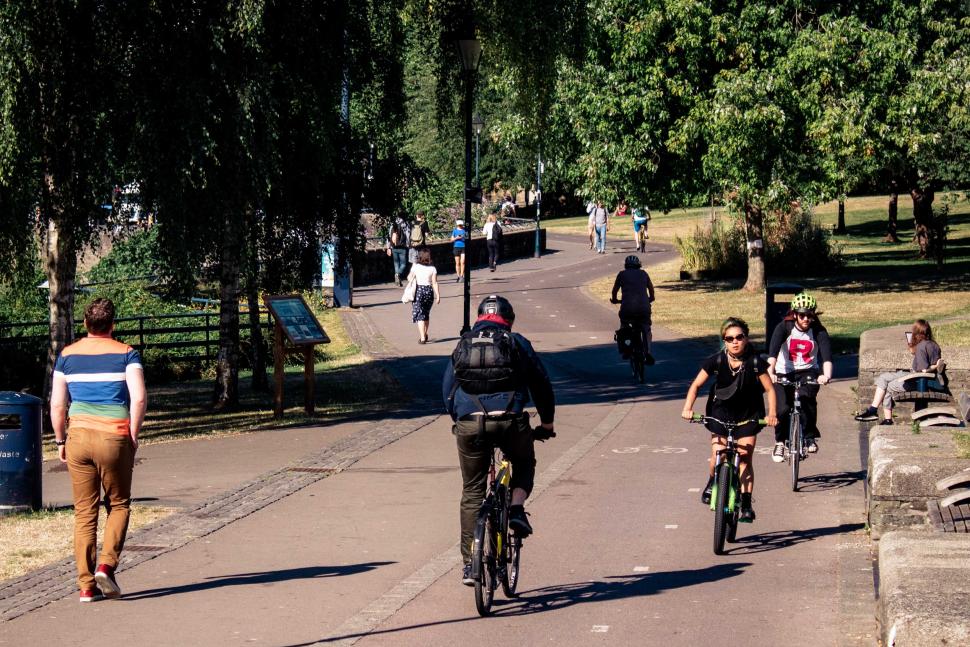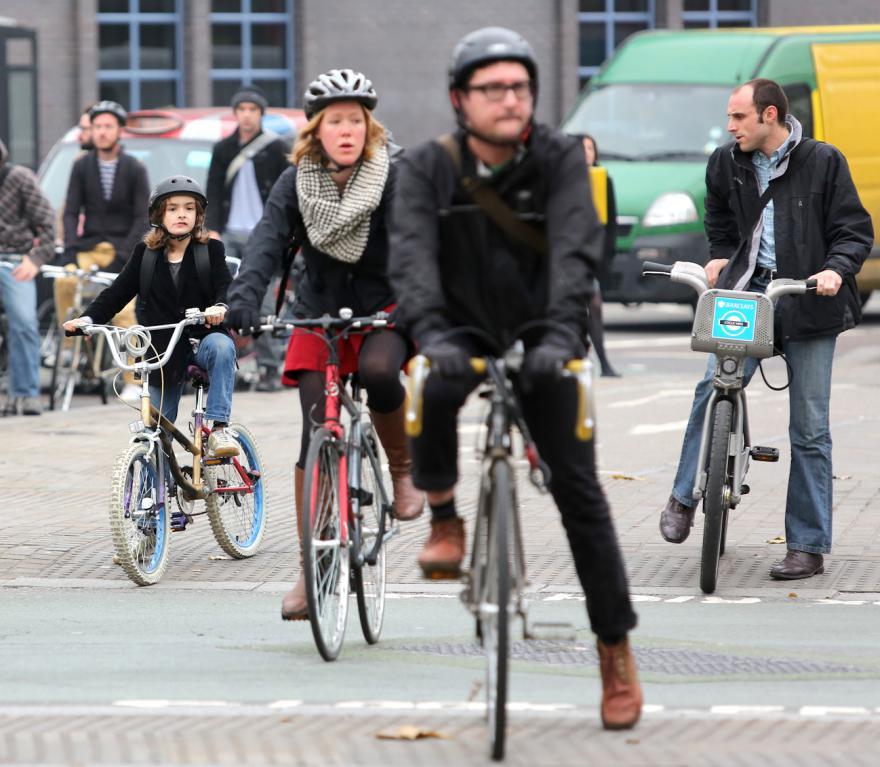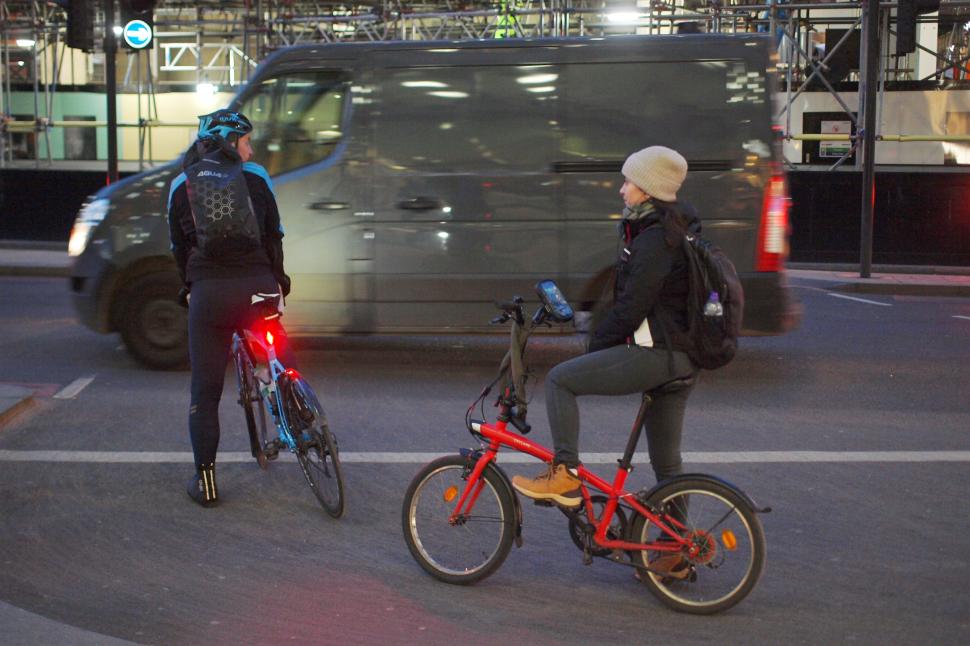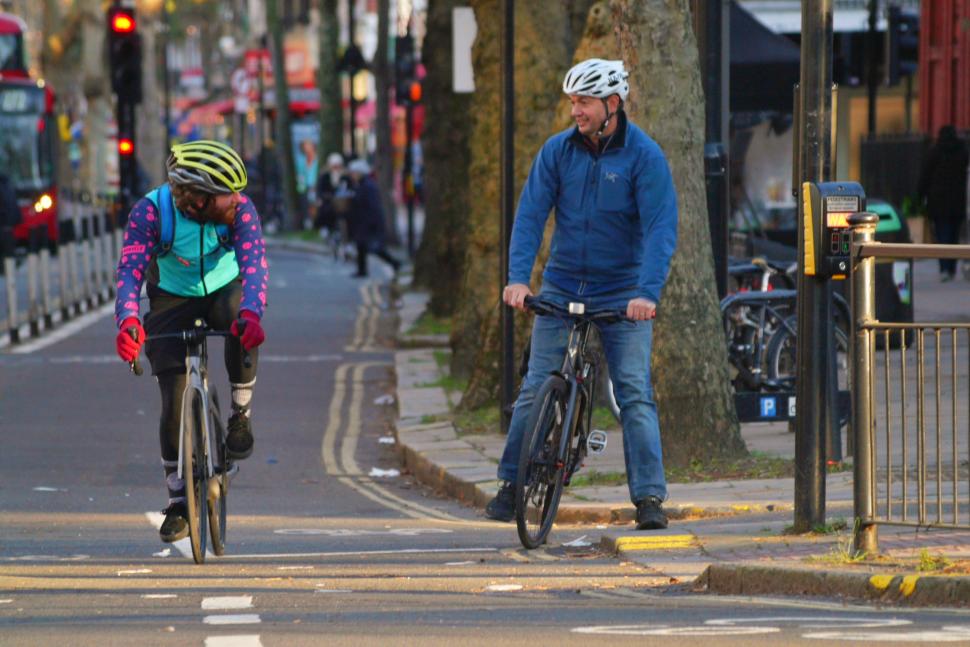- News
- Reviews
- Bikes
- Components
- Bar tape & grips
- Bottom brackets
- Brake & gear cables
- Brake & STI levers
- Brake pads & spares
- Brakes
- Cassettes & freewheels
- Chains
- Chainsets & chainrings
- Derailleurs - front
- Derailleurs - rear
- Forks
- Gear levers & shifters
- Groupsets
- Handlebars & extensions
- Headsets
- Hubs
- Inner tubes
- Pedals
- Quick releases & skewers
- Saddles
- Seatposts
- Stems
- Wheels
- Tyres
- Tubeless valves
- Accessories
- Accessories - misc
- Computer mounts
- Bags
- Bar ends
- Bike bags & cases
- Bottle cages
- Bottles
- Cameras
- Car racks
- Child seats
- Computers
- Glasses
- GPS units
- Helmets
- Lights - front
- Lights - rear
- Lights - sets
- Locks
- Mirrors
- Mudguards
- Racks
- Pumps & CO2 inflators
- Puncture kits
- Reflectives
- Smart watches
- Stands and racks
- Trailers
- Clothing
- Health, fitness and nutrition
- Tools and workshop
- Miscellaneous
- Buyers Guides
- Features
- Forum
- Recommends
- Podcast
 Cyclists and pedestrians in Castle Park, Bristol (image: Adwitiya Pal)
Cyclists and pedestrians in Castle Park, Bristol (image: Adwitiya Pal)Average cycling distances in England fall to lowest levels in a decade: Government urged to deliver on active travel promises as think tank expert slams transport system as “broken and stacked against poorest in society”
Just a week on from newly appointed Transport Secretary Louise Haigh pledging to invest “unprecedented levels of funding” in cycling and walking, as well as developing a new road safety strategy, think tanks and campaigners have urged the Labour government to act quickly on their active travel promises after official figures revealed that distances cycled annually in England have fallen to their lowest levels in a decade, while car journeys continue to rise.
According to figures released this week by the Department for Transport as part of its annual National Travel Survey, cycling accounted for two per cent of all trips made in England in 2023, and one per cent of distance travelled on average.
The average person made 15 cycling trips throughout the year, the same number as 2022, but down from the high of 20 annual trips in 2020.
Cycling’s decline in England since its pandemic-related boom four years ago is also strikingly evident in the average cycling miles travelled, which fell to levels last seen in 2013. According to the DfT’s figures, the average person in England cycled 47 miles during 2023, just over half of the high-water mark of 2020, which saw 88 miles travelled on average by bike.
However, 2023’s average distance was also 17 per cent down on the previous year’s figure of 57 miles per person, and below the pre-pandemic average of 54 miles in 2019.
The DfT noted that this drop could be attributed to a range of factors, such as shorter trip lengths and changes in the nature of cycling activities. It also pointed out that the government’s traffic statistics show that there were 3.6 billion miles travelled by cycling in 2023, which was still seven per cent lower than 2022’s mileage, but roughly the same as 2019, and that the relatively small number of cycling trips recorded in the survey could account for the variations between these statistics.
Meanwhile, leisure retains its status as the most common purpose for cycling in England, with 40 per cent of all trips by bike in 2023 made for leisure purposes (up from four per cent the previous year).
Cycle commuting trips remain proportionately down compared to pre-pandemic levels, with 29 per cent of cycling activities in 2023 related to getting to work (compared to 30 per cent in 2022 and 33 per cent in 2019), followed by education (13 per cent) and shopping (nine per cent).
Men also continue to dominate the cycling figures, recording 22 cycling trips and 72 miles on average, compared to nine trips and 23 miles for women.
While cycling continues to endure something of a post-pandemic malaise, it’s not all doom and gloom for active travel. The survey revealed that walking and wheeling is steadily increasing, averaging 225 miles per person in 2023, the highest mileage since the survey began in 2022 (despite the number of trips falling by one to 263).
However, despite some positive signs for active travel, the distance travelled by car, while still lower than 2019, continues to climb in the post-lockdown era. Car trips, either as a driver or passenger, made up 78 per cent of the average distance travelled in 2023, an increase of almost 500 miles per person since 2022. Bus journeys, meanwhile, have continued to plummet, with the average distance outside London down 31 miles compared to 2019, and forty per cent off the miles recorded over two decades ago in 2002.
Responding to the survey’s findings, Catherine Woodhead, the chief executive of active travel group Living Streets, said: “It’s clear there’s work needed to help get more of us walking and wheeling. The government needs to invest in making streets both safer and more welcoming for everyone, and that includes an end to pavement parking.”
“It’s great to see more people embracing walking as transport, but the plateau of cycling figures suggests more needs to be done to improve our cycle network, improving health, and reducing the burden on NHS,” added the Campaign for Better Transport’s Michael Solomon Williams.
> Cycling levels dropped in England because “short-sighted councils pulled out protected lanes”
The survey also highlighted both the rising car dependence of people in England and a growing mobility divide based on wealth, which has led the Institute for Public Policy Research (IPPR) to argue that the UK’s current transport system is “stacked against the poorest in society”.
According to the DfT’s survey, those on the lowest income by quintile travelled on average 4,400 miles fewer in 2023 than people on the highest income, and over 2,300 miles fewer than the average person. People on the lowest income made over 170 fewer trips than those on the highest incomes.
Those on the lowest income are also the least likely to have access to a car – 44 per cent of households in the lowest quintile do not own a car, compared to 15 per cent in the highest quintile.
“These statistics reveal the scale of the challenge the new government has inherited in transport,” Stephen Frost, a principal research fellow at the IPPR, an independent think tank and charity “working towards a fairer, greener, and more prosperous society”, said in response to the new statistics.
“The transport system is broken. It is currently stacked against the poorest in society and many have limited, or no, access to healthy, sustainable, and affordable ways to travel.
“The new transport secretary has rightly said that ‘fixing’ transport is key to the success of all Labour’s missions – including growing the economy, meeting the UK’s climate commitments and improving public health.
“The government has limited time to achieve these goals and must quickly deliver on its promise of ‘unprecedented levels of funding’ for active travel if it is to keep its targets in reach and make streets safer and more attractive.
“England’s first integrated transport strategy is a welcome opportunity to make transport work better for ordinary people and put in place a long-term plan to tackle the underlying inequalities caused by forced car dependency.”
> Labour government to invest "unprecedented levels of funding" in cycling
Last week, speaking to Laura Laker for the Guardian, Labour’s new Transport Secretary Louise Haigh explained how active travel would form an important part of the government’s approach to improving health and the environment, adding that “walking and cycling and moving more are essential to solving both of these in the immediate term and in the long term”.
“There’s lots of evidence to show that will reduce the number of GP appointments by hundreds of thousands, if not millions,” Haigh said. “We absolutely want to make sure that we invest at unprecedented levels.”
After obtaining a PhD, lecturing, and hosting a history podcast at Queen’s University Belfast, Ryan joined road.cc in December 2021 and since then has kept the site’s readers and listeners informed and enthralled (well at least occasionally) on news, the live blog, and the road.cc Podcast. After boarding a wrong bus at the world championships and ruining a good pair of jeans at the cyclocross, he now serves as road.cc’s senior news writer. Before his foray into cycling journalism, he wallowed in the equally pitiless world of academia, where he wrote a book about Victorian politics and droned on about cycling and bikes to classes of bored students (while taking every chance he could get to talk about cycling in print or on the radio). He can be found riding his bike very slowly around the narrow, scenic country lanes of Co. Down.
Latest Comments
- imajez 2 hours 22 min ago
- looks like someone has fallen for the steel is real markerting BS. I only care how a bike rides, not what it is made of. I had a lovely steel...
- lonpfrb 3 hours 42 min ago
That argument is ignorance of the widespread height and width restrictions to be found on the many minor roads that were originally created for...
- David9694 5 hours 57 min ago
cyclists should be made to have number plates - Interesting police video here of the range of illegal number plates - we'd got, as the caption says...
- rookybiker 7 hours 10 min ago
The trailer seems to connect to both ends of the rear axle. Can it do tight corners without dragging the tyre sideways?
- froze 7 hours 14 min ago
Motorists have always been unkind to cyclists, but distracted driving is adding to the problem....
- Destroyer666 8 hours 7 min ago
Have you owned Bont shoes? In my experience even the widest Lake shoes have had a bizarre form of narrowing way too much in the toe area. But the...
- froze 8 hours 35 min ago
Not sure if this is possible, but this news letter goes out all over the world, and some places like Decathlon does not send stuff to America, in...
- Hirsute 9 hours 19 min ago
I'm confused as to why you'd need bib shorts indoors.
- Oldfatgit 9 hours 48 min ago
I'm sure you were being sarcastic... however ... Lewis Hamilton lives in Monaco. Yet another car driver that doesn't pay any tax



Add new comment
22 comments
Black Cat roundabout in Cambridgeshire on A428 redevelopment to cut journey times by ten minutes = £1bn.
Active Travel England budget per year (Tory era) = £101m
https://www.ippr.org/media-office/years-of-under-investment-in-englands-streets-has-left-people-walk-wary-and-cycle-cautious-says-new-report
Meanwhile media reports come in that cycling is in decline, totally unexpected....
Not surprising at all local infra in my area either exists in a morse code kinda fashion or it's simply not there. Given the fact most riders will soon have the over-reaching ballbags in blue just so they can "caution" riders over the new dangerous cycling law....
Need I remind the country that drivers have been banned from street parking....oh wait they don't have the numbers for that one
Keeping dangerous drivers off the road.... Courts keep letting them back on them the road so never mind
..............
New solution metal zip ties through all fuel pump handles? Evening shut down fuel stations that are too close to eachother..... Few years ago there used to be two shell stations and an Esso on the same quarter mile stretch of road, two are left I'll let you guess which!
I really like this description
This isn't surprising. Cycling on UK is pretty petrifying at times. I've cycled 1250 miles this year so far (for fitness with a few Brompton rides into London for evenings out etc). Drivers in the UK fall in to 3 categories 1) Drivers who don't understand cyclists through lack of awareness of what cycling on roads is like and often drive dangerously, 2) Drivers who obviously hate cyclists and drive super-aggressively, at thimes these drivers feel like they would happily murder you to gain a few seconds on their journeys, and 3) Drivers who are either cyclists themselves or are just safe and considerate drivers. Group 3 is the minority. Add in that we are generally and hilly country with quite a bit or rain, you cant blame people for not wanting to cycle. I've just returned from holiday in Belgium and Netherlands where the infrastructure is incredible. Basically every road has either a cycle lane or there's a completely separate cycle path. Cyclists are respected, prioritised and promoted. Cycling there was a pure joy. It didn't feel like every other car was being used as a killing machine by raging drivers. I wish the UK was more like that 😢
I once had a lift in an early morning bread delivery van in Belgium, there was a bizarre chasm between the exaggerated care with which he drove around cyclists and the homicidal pavement driving indifference to pedestrians caught retarding his progress, was it just that it was still the era of Eddy Merckx or do the Belgians have some deep special respect for riders of the bicycle?
This may well change If the predicted 5p fuel duty rise does actually happen. That will take prices in some places to over 150.99 a litre. The petrolheads are already having a meltdown about this on comment threads. Given the £22 billion black hole in public finances it could well be even more than 5p, maybe 10p. Given the other predicted rises and the ongoing cost of living crisis I think that quite a few bikes will be coming out of the garden sheds they've been languishing in.
I don't know if I'm more shocked by the survey results, or the reaction to it. Why is anyone surprised by this?
Outside of a few tiny pockets of cycle infra in the UK, the rest of us are cycling on roads only touching distance away from trucks and a collection of drivers either drugged up or psychologically unstable to safely control tonnes of machinery around other people
I've had 3 passes in as many weeks, where the driver punish passed me, one even did the windscreen wash thing, simply for cycling on the road in front of them, and one crazy dude who drove after me to have an argument, simply because I made him stop, for 5 seconds, when I had the priority.
TBH what really surprises me is the focus on fewer woman cycling, when in fact it is a small percentage of a very small percentage of people cycling. Negligable amount of people cycling then. In my experience I see just as many woman as men on bikes, and a couple of kids cycling to school too. The goal really should be to make it possible for children to cycle which will benefit all.
The average person does not cycle at all, that is what an average annual mileage of 47 miles per person tells me.
I say this because In 2023 I cycled further than ever before about 2000 miles. That was about 1/5 of the miles I travelled by car. Since 2020 my annual car mileage has fallen by 50%. My cycling.mileage has increased year on year since 2012. However my cycling mileage for the purpose of anything other than general fitness is tiny. A few trips to pubs for lunch, although then my wife would join me by driving there. So really you could say as a family we are adding to the problem.
This year, since the accident last September when my hip stopped working properly, I have only cycled about 100 miles to try and retain some fitness.
I have just had the hip replaced and I hope to be cycling again in about 3-4 weeks.
I am a reasonably keen cyclist so may be an average contender for average cyclist. My mileage of 2000 would mean 41 other people would who had cycled 0 miles would then AVG 47 miles. Which would suggest very roughly given my increasing mileage versus their declining mileage that only about 1in 20 of the population cycle at all. The official stats say that it is about 1 in 9.
At 1 in 9 the average cyclist is cycling 470 miles a year.
Correct. To a first approximation people don't cycle in the UK. I think nationally it's at about 1-2% of trips. And as you suggest most people simply don't, or just a couple of times a year / down the park. So a relatively few people are (by cycling a LOT) are generating the numbers. Compare that with somewhere "everyone cycles" [overview] [2017 figures] [current figures and challenges].
Most journeys which could be cycled are not cycled*. In fact many journeys which could be walked (by people who are easily able to) are driven.
I suspect some journeys driven don't "need" to be at all - it's simply we have the car right there (or we're in it already) (yes - who judges...?) And of course because many of us have had access to a vehicle over a couple of generations we have now literally "built in" a certain number of journeys being driven.
* Hand-wavy here but say "by 'normal people' on 'practical bikes' ". Let's say under 4 miles / 30 minutes. IIRC there are various stats suggesting that journeys become less frequent at above 30 minutes journey time no matter the mode.
In 1980s, I moved to LB Newham. You'd see people wait for bus to take them little more than 400 yards. Much more than that was a daring adventure into another 'manor'.
I'd grown up in Tunbridge Wells, with virtually no buses, always walked fast everywhere up to ten miles. Newham just 3½ miles across. My colleagues, fromm Netherlands and Germany also walked
It wouldn't make any difference of the average person did cycle. The average person doesn't actually exist, so if they cycled they would add zero miles to the stats.
Excellent & beat me to it. My driving has increased to c2,000 miles pa as chauffeur for wife, who suffers effects of several bad hits over 50 years, and her frail friends. I cycle or walk up to 10 miles each way in London or take transport.
London is utterly different from rest of UK for public transport, ease of walking, eg Green Chain & Thames Path, etc for 30 mile power walks that are easier to access and more varied than out in sticks, eg Wimborne, Leeswood, etc.
Cycle paths from Greenwich to Surrey Quays and beyond - swamped with bikes almost as many as cars during Wednesday rush hour. Wimborne, last week, I counted: 9 bikes, 10 pedestrians, 0 buses to 650 motor vehicles in 1 hour as I walked by the cycle path from Wimborne to Ferndown starting about 7.15am. The cycle path is stunningly good but, despite being long, still ends in cycling horror of c1 metre concrete wall next to road with no escape space!
Son in North Wales Leeswood has nowhere for cycling or walking except around the village! Absolutely no chance of taking the grandchildren cycling. Contrast daughter and 8-month granddaughter in Lewisham - balance bike in shopping list for next year.
However... not all roses in London. Lots of frail riders giving up due to behaviour of other riders on ebikes, escooters, heavy runners - terrifying! Anecdotally, talking to acquaintances who have stopped riding or never did, the biggest problem is other people on various forms of 2-wheeled transport racing, jumping kerbs, switching line, gravy, wide handlebars, fast
You're now doing 30 mile power walks aged 69 in addition to your previous claim of 45 km/h on the flat with no wind assistance whilst spinning out a 50/11 gear? You're a wonder, Mr Mitty, and no mistake.
A quick google search would suggest there are plenty of cycling routes round Leeswood North Wales but I guess you knew that already.
Yes - being bounced around by the earth tremors as they pass is no joke at all.
Here in the shires, it's more likely to be a slick of red wine reduction.
Saucy! Jus' 'cos you live in the stock-broker belt...
I've just realised that it is average 47 miles per person PER YEAR


What? That's nearly a whole mile per week!
That may well be an exaggeration too!
RE: "Average cycling distances in England fall to lowest levels in a decade"
I apologise. I will try to add some miles to help pick the average up.
Only counts if they're south of Berwick.